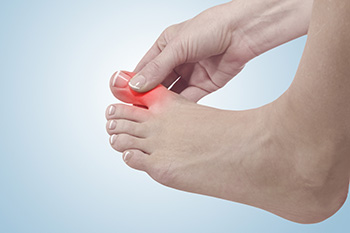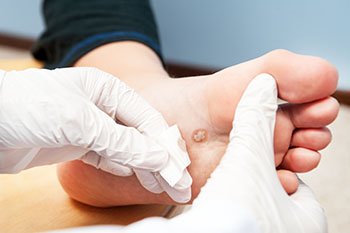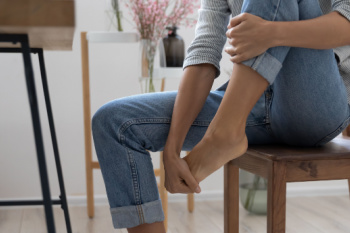Connect With Us
Blog

Gout is a form of inflammatory arthritis that results from the buildup of uric acid crystals in the joints. It often causes sudden and severe pain, swelling, redness, and tenderness, and most commonly affects the big toe. The pain may start at night and can be intense enough to wake someone from sleep. Gout is accompanied by severe pain, causing difficulty in completing daily activities. Several factors increase the risk of developing gout. These include a diet high in red meat or seafood, excessive alcohol consumption, obesity, and certain health conditions such as hypertension or kidney disease. Genetics may also play a role. If you have pain in the joints of your feet, particularly the big toe, it is strongly suggested that you are under the care of a podiatrist who can diagnose gout and offer management options.
Gout is a painful condition that can be treated. If you are seeking treatment, contact Gerald Erskine, DPM from Seneca Family Footcare. Our doctor will treat your foot and ankle needs.
What Is Gout?
Gout is a form of arthritis that is characterized by sudden, severe attacks of pain, redness, and tenderness in the joints. The condition usually affects the joint at the base of the big toe. A gout attack can occur at any random time, such as the middle of the night while you are asleep.
Symptoms
- Intense Joint Pain - Usually around the large joint of your big toe, and it most severe within the first four to twelve hours
- Lingering Discomfort - Joint discomfort may last from a few days to a few weeks
- Inflammation and Redness -Affected joints may become swollen, tender, warm and red
- Limited Range of Motion - May experience a decrease in joint mobility
Risk Factors
- Genetics - If family members have gout, you’re more likely to have it
- Medications - Diuretic medications can raise uric acid levels
- Gender/Age - Gout is more common in men until the age of 60. It is believed that estrogen protects women until that point
- Diet - Eating red meat and shellfish increases your risk
- Alcohol - Having more than two alcoholic drinks per day increases your risk
- Obesity - Obese people are at a higher risk for gout
Prior to visiting your podiatrist to receive treatment for gout, there are a few things you should do beforehand. If you have gout you should write down your symptoms--including when they started and how often you experience them, important medical information you may have, and any questions you may have. Writing down these three things will help your podiatrist in assessing your specific situation so that he or she may provide the best route of treatment for you.
If you have any questions, please feel free to contact our office located in Ronceverte, WV . We offer the newest diagnostic and treatment technologies for all your foot care needs.

Plantar warts are small, rough growths that develop on the soles of the feet due to infection with the human papillomavirus. They often appear on weight-bearing areas such as the heels or balls of the feet, sometimes causing discomfort or pain when walking. The virus enters the skin through tiny cuts or abrasions, making public places like around swimming pools, locker rooms, and communal showers common sources of exposure. Walking barefoot in these areas increases the risk of infection. Weakened immune function may also make some people more susceptible. Plantar warts can sometimes develop in clusters, known as mosaic warts, which are more difficult to treat. Plantar warts can be painful and may cause difficulty in completing daily activities. If you have developed this foot condition, it is suggested that you promptly consult a podiatrist who can offer you effective treatment methods.
Plantar warts can be very uncomfortable. If you need your feet checked, contact Gerald Erskine, DPM from Seneca Family Footcare. Our doctor will assist you with all of your foot and ankle needs.
About Plantar Warts
Plantar warts are the result of HPV, or human papillomavirus, getting into open wounds on the feet. They are mostly found on the heels or balls of the feet.
While plantar warts are generally harmless, those experiencing excessive pain or those suffering from diabetes or a compromised immune system require immediate medical care. Plantar warts are easily diagnosed, usually through scraping off a bit of rough skin or by getting a biopsy.
Symptoms
- Lesions on the bottom of your feet, usually rough and grainy
- Hard or thick callused spots
- Wart seeds, which are small clotted blood vessels that look like little black spots
- Pain, discomfort, or tenderness of your feet when walking or standing
Treatment
- Freezing
- Electric tool removal
- Laser Treatment
- Topical Creams (prescription only)
- Over-the-counter medications
To help prevent developing plantar warts, avoid walking barefoot over abrasive surfaces that can cause cuts or wounds for HPV to get into. Avoiding direct contact with other warts, as well as not picking or rubbing existing warts, can help prevent the further spread of plantar warts. However, if you think you have developed plantar warts, speak to your podiatrist. He or she can diagnose the warts on your feet and recommend the appropriate treatment options.
If you have any questions please feel free to contact our office located in Ronceverte, WV . We offer the newest diagnostic and treatment technologies for all your foot and ankle needs.

Arthritis in the toes can cause significant discomfort and impact mobility. Swelling is a common symptom, often making shoes feel tighter and causing tenderness with pressure. Soreness may be persistent or worsen with activity, leading to difficulty walking or standing for long periods. Restricted movement can develop as the joints become stiff, making it challenging to bend or flex the toes. Additionally, redness and warmth surrounding the affected joints may indicate inflammation, often accompanied by pain. In more advanced cases, deformities such as bunions or claw toes can occur, altering the foot’s natural shape. The most common types of arthritis affecting the toes include osteoarthritis, rheumatoid arthritis, and gout. If you have toe pain, it is suggested that you confer with a podiatrist who can offer a proper diagnosis and treatment.
Toe pain can disrupt your daily activities. If you have any concerns, contact Gerald Erskine, DPM of Seneca Family Footcare. Our doctor can provide the care you need to keep you pain-free and on your feet.
What Causes Toe Pain?
Most severe toe pain is caused due to a sports injury, trauma from dropping something heavy on the toe, or bumping into something rigid. Other problems can develop over time for various reasons.
Toe pain can be caused by one or more ailments. The most common include:
- Trauma
- Sports injury
- Wearing shoes that are too tight
- Arthritis
- Gout
- Corns and calluses
- Hammertoe
- Bunions
- Blisters
- Ingrown toenails
- Sprains
- Fractures (broken bones)
- Dislocations
When to See a Podiatrist
- Severe pain
- Persistent pain that lasts more than a week
- Signs of infection
- Continued swelling
- Pain that prevents walking
Diagnosis
In many cases the cause of toe pain is obvious, but in others, a podiatrist may want to use more advanced methods to determine the problem. These can range from simple visual inspections and sensation tests to X-rays and MRI scans. Prior medical history, family medical history, and any recent physical traumatic events will all be taken into consideration for a proper diagnosis.
Treatment
Treatments for toe pain and injuries vary and may include shoe inserts, padding, taping, medicines, injections, and in some cases, surgery. If you believe that you have broken a toe, please see a podiatrist as soon as possible.
If you have any questions please feel free to contact our office located in Ronceverte, WV . We offer the newest diagnostic tools and technology to treat your foot and ankle needs.

